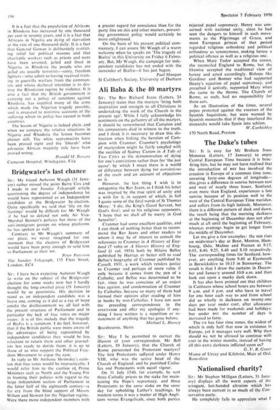The Duke's tubes
Sir: It is easy for Mr Braham from Menorca (Letters, 17 January) to enjoy Central European Time because it is bene- fiting him, but he may not have realised that the introduction of BST has involved the creation in Europe of a common time zone, covering forty-one degrees of longitude— this gives a difference in sunrise between east and west of nearly three hours. Scotland, even more than England, experiences a late sunrise because of its position well to the west of the Central European Time meridan, and suffers from its high latitude. Moreover, there is a different pattern of dusk and dawn, the result being that the morning darkness at the beginning of December does not alter much at all until the beginning of February, whereas evenings begin to get longer from the middle of December.
Let me give a few examples: the sun rises on midwinter's day at Brest, Menton, Ham- bourg, Oslo, Malmo and Poznan at 9.15, 8.05, 8.40, 925, 8.40 and 8.10 respectively. The corresponding times for Scotland, how- ever, are anything from 9.40 at Eyemouth in Berwickshire to 10.15 in Stornoway. The result is that I draw the curtains in Decem- ber and January around 10.0 a.m. and then look out upon a murky dark dawn.
It has also been pointed out that children in Caithness whose school hours are between 9 a.m. and 4 p.m. and who have to travel for one hour each way to and from school did so wholly in darkness on twenty-one days per year under GMT, after allowance had been made for weekends and holidays; but under Bsr the number of days is increased to forty.
The us has four time zones, the widest of which is only half that now in existence in Europe, yet it manages very well. Why then should we not be allowed to continue with GMT in the winter months, instead of having all this extra darkness inflicted upon us?
G. V. R. Grant Manse of Urray and Kilchrist, Muir of Ord, Ross-shire


































 Previous page
Previous page